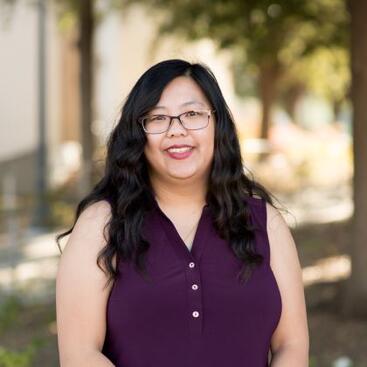Advancement Ally - Dr. Mai Vang
Director, Constituent Management & Technologies
1. What is your full name and is there a meaning or story behind it?
Dr. Mai Vang or Dr. Maiv Vaj-Thoj
In Hmong, Mai is spelled “Maiv” which means “girl” or “daughter." In some realms, I refer to myself as “Dr. Maiv Vaj-Thoj," where Vaj is the Hmong spelling of Vang and Thoj is the Hmong spelling of Thao which is my partner's last name."
2. Pronouns:
She/her
3. How do you identify yourself or what is something you would like others to know about you?
My identities include being first-generation, Hmong-American, and a m/other of color. My identities shape what I pursue and how I make decisions on what I engage in. As a first generation, I try to give back to fellow first-generation students. Last school year, I participated in the First Generation Mentorship program and mentored two UCR first-year students. As a Hmong-American, I have engaged with the Hmong Student Association at UCR and shared my journey through higher education during one of their meetings. As a m/other of color, I navigate the dual consciousness of being a mother and woman of color where there are often conflicting pressures. I often use Critical Race Theory (CRT) to interrogate my own biases and reflect on the ways my identities affect my interactions with others or the opportunities presented./p>
4. What is your favorite comfort food?
My favorite comfort food would be boiled chicken, chicken soup with herbs, and rice. This is a common Hmong dish, typically enjoyed during special events and a high-protein diet after Hmong women give birth.
5. What are your favorite cultural or family traditions?
A Hmong cultural tradition that I hold dear to my heart are our blessing strings. During ceremonies, blessing strings are tied around our hand (or ankles) while our family and friends bless us with words of positivity, good health, protection, and well-being.
6. What is something people wrongly assume about you? (biases, stereotypes, ethnic identity, etc.)
Growing up in the central valley of California where there were many ethnic groups, as well as a diversity of immigrants and migrant families, I was often stereotyped as being Chinese. To be Hmong and stereotyped as "Chinese" meant that people assumed I knew karate, was great at math and I ate everything with chopsticks. On the contrary, I had to work extra hard to be good at math, I was a pretty clumsy kid growing up who had no karate moves, and the best way to eat rice is with your hands.
7. If you could change/create any policy (campus, state or national) what would it be and why?
If I could change/create any policy, I'd make higher education and health care free for everyone. Education allows us to gain the knowledge we need to prevent others from taking advantage of us or pursue the opportunities that are not presented to us. Health care is essential to ensure we all live rich, healthy, and thriving lives.
8. What is something you enjoy doing for others?
I genuinely enjoy helping others learn. I myself love to learn and have continued to learn beyond what most would have completed in terms of schooling. I also enjoy teaching or training others on topics that I have excelled at. In addition to my role as Director, Constituent Management & Technologies at UC Riverside, I am a Adjunct Professor at University of Redlands where I have taught for over three years on Marketing, Marketing Analytics, Excel Essentials, Market Research and Principles of Marketing.
9. What is something that makes you feel most alive?
Something that makes me feel alive is breezing through the lake on our boat, feeling the windy in my hair and losing track of the time as my partner and I fish. Slowing down, reflecting, concentrating on the moment, and being present is what makes me feel alive.
10. What is something that should be free but is not?
A college education should be free for everyone. Education is powerful, it can uplift communities.
11 Which affiliations/clubs/organizations/hobbies have you been involved in?
Diversity, Equity, Inclusion & Belonging (DEIB) Committee for University Advancement, MEI Staff Diversity Training & Certification at UCR, First-Generation Mentor Program - served as a mentor at UCR, Faculty of Color Caucus at University of Redlands and Critical Race Studies in Education Association (CRSEA).
12. What is your favorite thing about working at UCR or your favorite UCR memory?
My favorite thing about working at UCR is the boundless opportunities to engage, connect, and work with a diverse population of staff, faculty, and students. I'm not the one of or the only at UCR. I am amongst a large population of go-getters and do-gooders.
